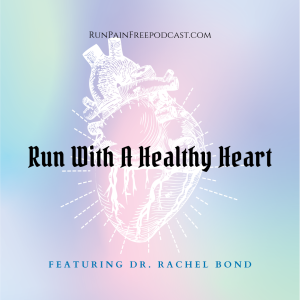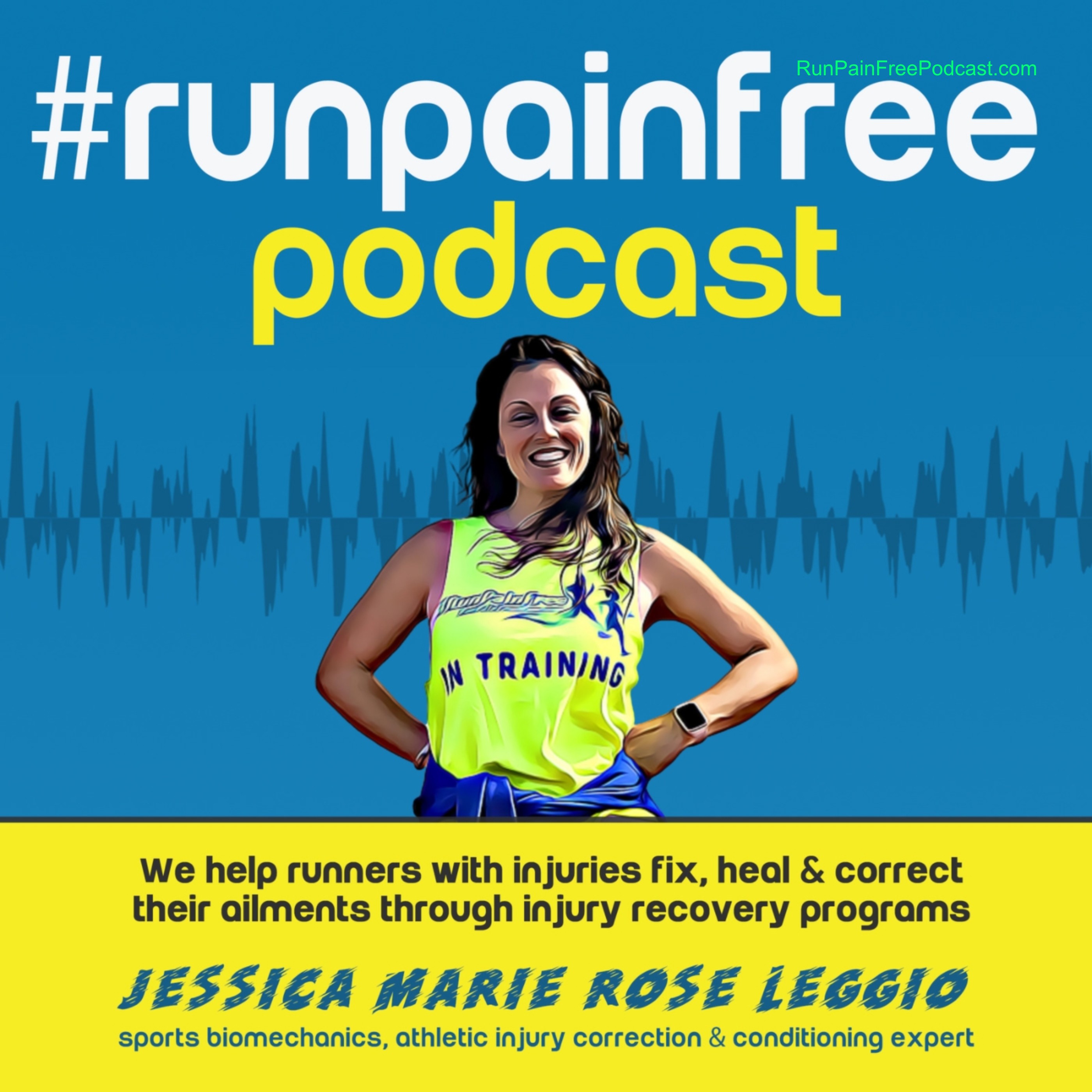Episodes

Sunday Feb 14, 2021
🎧 Are You Running With A Healthy ❤️ Heart? 🏃♀️
Sunday Feb 14, 2021
Sunday Feb 14, 2021
In today's podcast, Coach Jessica Marie Rose Leggio interviews cardiologist Dr. Rachel Bond.
Get an Assessment With Jessica: https://www.runpainfreenow.com.
We discuss what runners need to know should they face a heart problem when running. Dr. Bond breaks down the different types of heart problems and discusses the underlying risk factors.
So pay attention, this one is a lifesaver!
Heart attack
The technical term for a heart attack is a myocardial infarction. It occurs where the heart has a build-up of plaque. To keep it simple, plaque is the build of cholesterol in the artery. Eventually, the plaque can become unstable and rupture. This occurrence leads to the body creating new cells that go to that area to protect that plaque. As a result, it closes off blood flow to an area of the heart.
Bottom line: A heart attack is an emergency. Call 911, get to the hospital ASAP, so you are provided medical care.
Cardiac arrest
80% of the time, a cardiac arrest occurs because your heart completely stops. 20% of the time, a cardiac arrest is brought on by breathing difficulties—for example, a drowning swimmer or someone who has ingested intoxicants.
Bottom line: A cardiac arrest means you don't have a pulse. That's an emergency. If you notice a runner that has collapsed on the run, check their pulse immediately and call 911. If you have appropriate training, do chest compressions until the ambulance arrives.
Sudden death
Sudden death is a form of cardiac arrest that occurs when the person doesn't have any risk factors for underlying heart disease.
Bottom line:
-
Call 911.
-
If trained, start CPR immediately.
-
Find and source an automatic external defibrillator.
If you have any of these symptoms, do a stress test.
Stress tests are given to people when there is a suspicion that they have underlying heart disease. Symptoms of underlying conditions may include someone who experiences chest discomfort and difficulty breathing when exerting themselves. However, often medical professionals don't know women's specific heart attack symptoms.
"For women a heart attack may have symptoms of fatigue, dizziness, or a racing heart."
A stress test should also be performed for people with a family history of early heart disease.
Heart attacks kill more women than all cancers combined. Here's what you need to know
You may think breast cancer is the most significant risk for women; however, the sad news is that it is a heart attack. While cardiovascular disease doesn't have one screening tool such as the mammogram, 80% of the time, heart disease is driven by risk factors.
What are the risk factors?
· Elevated blood pressure
· Issues with cholesterol
· Excess weight and obesity
· Inactivity – less than 150 minutes per week of moderate exercise
· Smoking
· Alcohol
Women-specific risk factors
Women-specific risk factors often have to do with hormonal changes that occur during pregnancy. Suppose a woman experienced a complication during pregnancy such as high blood pressure, pre-term labor (before 37 weeks), or preeclampsia. In that case, they have a higher risk for heart disease.
Bottom line: If you have any of these risk factors, without question, you need to be evaluated by a doctor and possibly a cardiologist.
Heart attack symptoms: the difference between men and women
In most cases, women present very similar symptoms to men when experiencing a heart attack.
"A heart attack feels like an elephant is sitting on your chest. This is a classic phrase we hear in the cardiology world."
However, a third of women may not experience any chest pain. Instead, they may experience neck, back, or jaw pain. Additionally, women may experience dizziness episodes; they may break out in a sweat or feel nauseous.
The red flag for women is fatigue. If you are doing everything right: taking your vitamins, eating healthy, sleeping well, but your body still feels tired, it could be related to heart disease.
Bottom line: If you are doing everything right but feeling burnt out and lethargic, go to your doctor and get checked out.
Training the heart
Just like your legs, your heart is a muscle, and it needs to be trained. The longer you run, or the more significant the intensity, the harder your heart has to work. When you run, you don't just increase your heart rate but also your blood pressure. This increased blood pressure also increases the workload on your heart as it moves blood around your body.
Bottom line: You need to train your heart with low aerobic activity levels over an extended period. If you don't have a solid aerobic base or 'lifetime miles,' before signing up for your first half marathon, consult your doctor.
Take-home lesson: Why minorities have a higher risk of heart disease.
The past 12 months has elevated the American consciousness that people of color experience systemic racism.
Unfortunately, the medical field is not immune to this either. As Dr. Bond notes, African Americans coming to the hospital are less likely to get the appropriate amount of pain medication nor receive proper cardiovascular care.
"Racism is a huge risk factor for cardiovascular disease. It's a public health crisis. It's something that we as a society absolutely have to work on.
Racism impacts the multitude of social determinants of health. It causes inequity in health outcomes. Where you were raised, your education, your ability to access healthy supermarkets, the type of work you do all play a role in your heart's health.
Bottom line: Continue to educate yourself so you can advocate for the care you need when you need it.
TIMESTAMPS
1:42 – Dr. Rachel Bond introduction and biography (which is fantastic, BTW)
6:20 – Heart attack
7:12 – Cardiac arrest
8:46 – Sudden death
10:13 – Stress tests
13:13 – Heart attacks kill more women than all cancers combined
17:22 – Different heart attack symptoms between men and women
20:44 – Training the heart
22:28 – Why minorities are at a higher risk of heart attack
KEY LEARNING POINTS
· Your heart is a muscle, and it needs to be trained and conditioned for long-distance running
· If you are new to running, get a checkup with your doctor before signing up for your first half marathon or marathon
· Heart attacks kill more women than all cancers combined
· If you have any heart disease risk factors, get a checkup with a doctor or cardiologist
· If a runner collapses on a run, call 911. Start CPR if you are trained to do so, or find someone who is.
LINKS MENTIONED
Get an Assessment With Jessica: https://www.runpainfreenow.com.
Learn more about Dr. Rachel Bond's work:
Resources & Programs To Run Injury-Free: https://members.runpainfreeacademy.com
Social determinants of health: https://www.who.int/gender-equity-rights/understanding/sdh-definition/en/


No comments yet. Be the first to say something!